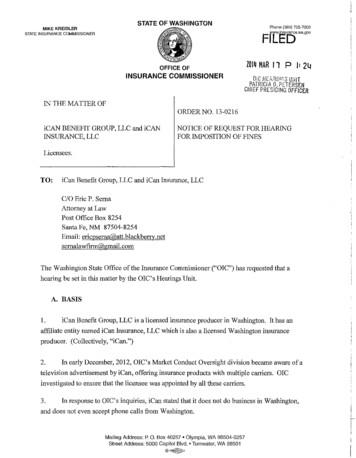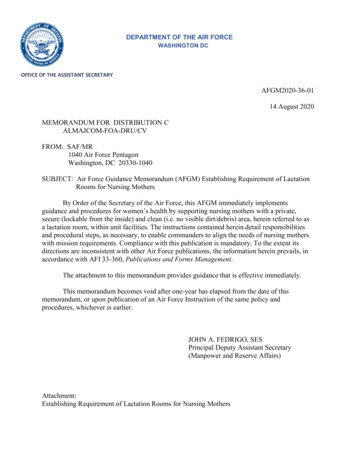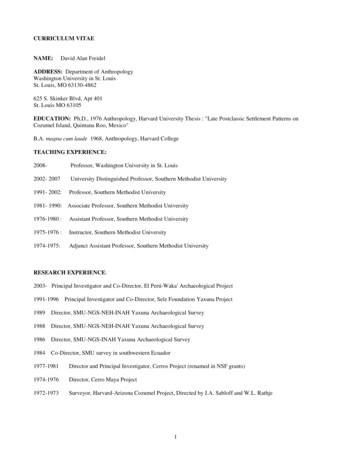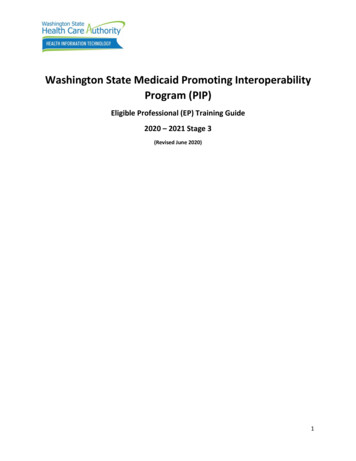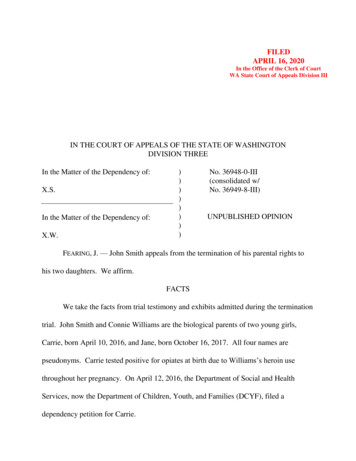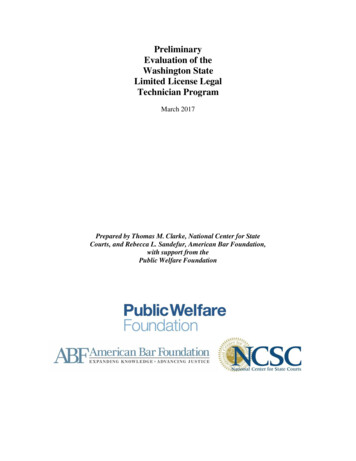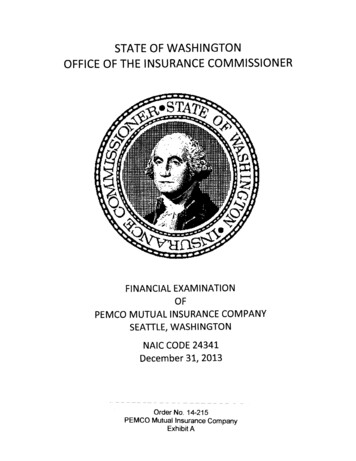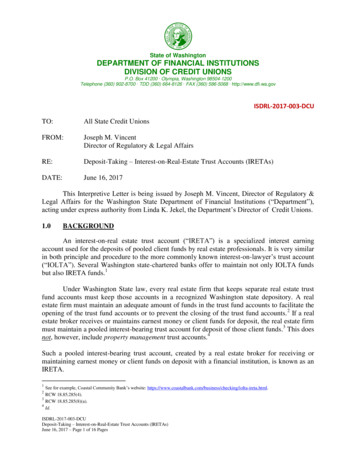
Transcription
State of WashingtonDEPARTMENT OF FINANCIAL INSTITUTIONSDIVISION OF CREDIT UNIONSP.O. Box 41200 Olympia, Washington 98504-1200Telephone (360) 902-8700 TDD (360) 664-8126 FAX (360) 586-5068 http://www.dfi.wa.govISDRL-2017-003-DCUTO:All State Credit UnionsFROM:Joseph M. VincentDirector of Regulatory & Legal AffairsRE:Deposit-Taking – Interest-on-Real-Estate Trust Accounts (IRETAs)DATE:June 16, 2017This Interpretive Letter is being issued by Joseph M. Vincent, Director of Regulatory &Legal Affairs for the Washington State Department of Financial Institutions (“Department”),acting under express authority from Linda K. Jekel, the Department’s Director of Credit Unions.1.0BACKGROUNDAn interest-on-real estate trust account (“IRETA”) is a specialized interest earningaccount used for the deposits of pooled client funds by real estate professionals. It is very similarin both principle and procedure to the more commonly known interest-on-lawyer’s trust account(“IOLTA”). Several Washington state-chartered banks offer to maintain not only IOLTA fundsbut also IRETA funds.1Under Washington State law, every real estate firm that keeps separate real estate trustfund accounts must keep those accounts in a recognized Washington state depository. A realestate firm must maintain an adequate amount of funds in the trust fund accounts to facilitate theopening of the trust fund accounts or to prevent the closing of the trust fund accounts. 2 If a realestate broker receives or maintains earnest money or client funds for deposit, the real estate firmmust maintain a pooled interest-bearing trust account for deposit of those client funds.3 This doesnot, however, include property management trust accounts.4Such a pooled interest-bearing trust account, created by a real estate broker for receiving ormaintaining earnest money or client funds on deposit with a financial institution, is known as anIRETA.1See for example, Coastal Community Bank’s website: a-ireta.html.RCW 18.85.285(4).3RCW ing – Interest-on-Real-Estate Trust Accounts (IRETAs)June 16, 2017 – Page 1 of 16 Pages
2.0ISSUES1. Is a Washington State-chartered credit union (“State Credit Union”) authorized to maintainIRETA accounts?2. If so, what must a State Credit Union do with the interest earned on IRETAs it administers,and what other reporting requirements does the State Credit Union have in this regard?3.0SHORT ANSWERA State Credit Union is authorized under both federal and state law to keep and maintainIRETAs for Washington State real estate brokers. The requirements of a State Credit Union in itsadministering of IRETA accounts are as set forth in the analysis below.To the extent that the same or similar principles and procedures apply in a state other thanWashington in which a State Credit Union may have a deposit-taking branch, a State CreditUnion may maintain an IRETA account of a real estate broker licensed in that other state.4.0ANALYSIS4.1Authority under the Federal Credit Union Act. Federal Credit Union Act(“FCUA”) amendments in 2014 provided for enhanced, pass-through share insurance forIOLTAs and other similar escrows.5 The FCUA declares, in relevant part, as follows:(5) Coverage for interest on lawyers trust accounts (IOLTA) andother similar escrow accounts(A) Pass-through insuranceThe Administration shall provide pass-through share insurancefor the deposits or shares of any interest on lawyers trust account(IOLTA) or other similar escrow accounts.(B) Treatment of IOLTAs(i) Treatment as escrow accountsFor share insurance purposes, IOLTAs are treated as escrowaccounts.(ii) Treatment as member accountsIOLTAs and other similar escrow accounts are consideredmember accounts for purposes of paragraph (1), if the attorneyadministering the IOLTA or the escrow agent administering theescrow account is a member of the insured credit union in whichthe funds are held.(C) Definitions. For purposes of this paragraph:(i) Interest on lawyers trust accountThe terms “interest on lawyers trust account” and “IOLTA” meana system in which lawyers place certain client funds in interestbearing or dividend-bearing accounts, with the interest or5Pub.L. 113-252, adding 12 U.S.C. §1787(k)(5).ISDRL-2017-003-DCUDeposit-Taking – Interest-on-Real-Estate Trust Accounts (IRETAs)June 16, 2017 – Page 2 of 16 Pages
dividends then used to fund programs such as legal serviceorganizations who provide services to clients in need.(ii) Pass-through share insuranceThe term “pass-through share insurance” means, with respect toIOLTAs and other similar escrow accounts, insurance coveragebased on the interest of each person on whose behalf funds areheld in such accounts by the attorney administering the IOLTAor the escrow agent administering a similar escrow account, inaccordance with regulations issued by the Administration.(D) Rule of constructionNo provision of this paragraph shall be construed as authorizing aninsured credit union to accept the deposits of an IOLTA or similarescrow account in an amount greater than such credit union isauthorized to accept under any other provision of Federal or Statelaw.6[Emphasis added.]The phrase, “and other similar escrow accounts,” is somewhat unartful. IRETAs are notescrow accounts per se. They only become so when the funds (e.g., earnest money) aretransferred to an escrow agent for closing. They are, however, trust funds. An escrow is afiduciary (trust) relationship but is typically thought of as a more specialized one.The FDIC regulations are much broader for banks and do not even mention IOLTA byname. To be insured by the FDIC, an agent or nominee account like an IOLTA must expresslydisclose, by way of specific reference, the existence of any fiduciary relationship such as anagent or nominee pursuant to which funds are deposited into a bank account and on which aclaim for deposit insurance coverage is based. The FDIC has stated that such an account,including an IOLTA, must disclose that the funds are held by the nominal account holder on thebehalf of others.7However, to be fair to credit unions, we ought to consider that Congress’ use of languagemeant that they would likely perceive an IRETA to be an “escrow account” for pass-throughdeposit insurance purposes, otherwise why use the phrase, “and other similar escrow accounts.”IRETAs, in effect, perform the same or a similar function for real estate brokers that the IOLTAdoes for attorneys – they are trust funds and are denominated as such.4.2Authority under the 2016 NCUA Rule.The National Credit UnionAdministration (“NCUA”), in reliance upon the 2014 FCUA amendment, adopted a rulecovering IOLTA accounts “and other similar escrow accounts,” effective January 27, 2016,which added a section to Subpart A of Part 745 of Title 12 of the Code of Federal Regulations(12 C.F.R. Part 745). This new section of Part 745 reads in relevant part, as follows:§ 745.14 Interest on lawyers trust accounts and other similarescrow accounts.67Id.FDIC Opinion Letter No. 98—2 (June 16, 1998) at 940.html.ISDRL-2017-003-DCUDeposit-Taking – Interest-on-Real-Estate Trust Accounts (IRETAs)June 16, 2017 – Page 3 of 16 Pages
(a)(1) Pass-through share insurance. The deposits or shares ofany interest on lawyers trust account (IOLTA) or other similarescrow account in an insured credit union are insured on a“pass-through” basis, in the amount of up to the SMSIA8 for eachclient and principal on whose behalf funds are held in suchaccounts by either the attorney administering the IOLTA or theescrow agent administering a similar escrow account, inaccordance with the other share insurance provisions of this part.(2) Pass-through coverage will only be available if therecordkeeping requirements of §745.2(c)(1) of this part and therelationship disclosure requirements of §745.2(c)(2) of this partare satisfied. . . .(b) Membership requirements and treatment of IOLTAs. For shareinsurance purposes, IOLTAs are treated as escrow accounts.IOLTAs and other similar escrow accounts are consideredmember accounts and eligible for pass-through share insuranceif the attorney administering the IOLTA or the escrow agentadministering the escrow account is a member of the insuredcredit union in which the funds are held. In this circumstance,the membership status of the clients or the principals isirrelevant.(c) Definitions. For purposes of this section:.(ii) Other similar escrow account means an account where alicensed professional or other individual serving in a fiduciarycapacity holds funds for the benefit of a client or principal aspart of a transaction or business relationship. Examples of suchaccounts include, but are not limited to, real estate escrowaccounts and prepaid funeral accounts.(iii) Pass-through share insurance means, with respect toIOLTAs and other similar escrow accounts, insurance coveragebased on the interest of each person on whose behalf funds areheld in such accounts by the attorney administering the IOLTA orthe escrow agent administering a similar escrow account. . . .9Based upon the afore-mentioned NCUA rule, it is fairly clear that the NCUA hasinterpreted its authority from Congress to permit pass-through deposit insurance to “real estateescrow accounts.”10 What is not clear is what the NCUA means by a “real estate escrowaccount.” By using that example only, does NCUA mean the escrow account of a title companyor real estate escrow agent? Or does the NCUA also mean a real estate broker holding earnestmoney?11 Accordingly, the Division of Credit Union cannot rely upon the NCUA Rule alone as8SMSIA is the standard maximum share insurance amount. See 12 C.F.R. 745.1(e).912 C.F.R. § 745.14. For the Final Rule, see s/AG20151217Item2b.pdf.12 C.F.R. § 745.14(c)(ii).11“Other similar escrow account,” as defined in 12 C.F.R. §745.14(c)(2), “ means an account where a licensed professional or other individualserving in a fiduciary capacity holds funds for the benefit of a client or principal as part of a transaction or business relationship.”Notwithstanding the lack of clarity with respect to “real estate escrow agent” as its example, the Division of Credit Unions is confident in its10ISDRL-2017-003-DCUDeposit-Taking – Interest-on-Real-Estate Trust Accounts (IRETAs)June 16, 2017 – Page 4 of 16 Pages
dispositive of whether a State Credit Union may administer an IRETA for a real estate brokerdepositing earnest money.4.3An IRETA as an Incidental Power of a State Credit Union. Notwithstandingthe NCUA’s lack of clarity as set forth in Subsection 4.2 above, the Director of Credit Unions, incombination with an understanding of Congress’ intent as discussed above in Subsection 4.1,does have the authority to declare the administration of an IRETA as an incidental power of aState Credit Union pursuant to the Washington Credit Union Act (“WCUA”), provided that thisactivity is “necessary or convenient to enable [a State Credit Union] to conduct the business of acredit union.”12 Moreover, the statutory purpose of the Director of Credit Unions includes“protect[ing] . . . the interests of the general public, and . . . ensur[ing] that credit unions remainviable and competitive in this state.”13Accordingly, to that end, the Director of Regulatory & Legal Affairs, acting under theexpress authority of the Director of Credit Unions, does hereby determine that the administeringof IRETA accounts by a State Credit Union, consistent with the requirements of this InterpretiveLetter, is a permissible incidental power of a State Credit Union under the WCUA.4.4Director’s Requirements for Administering IRETAs – NCUA Rules. Eventhough the NCUA Rule was not completely clear as to the meaning of “other similar escrowaccounts,” the NCUA Rule is sufficiently clear as to the following safety-and-soundnessrequirements concerning the administration of an IRETA. These include: Maintaining the NCUA’s SMSIA limit for each client and principal on whosebehalf funds are held in such accounts by a real estate broker;14Following the NCUA’s recordkeeping requirements for insurance ofaccounts;15 andComplying with the NCUA’s relationship disclosure requirements.16A State Credit Union administering an IRETA must comply with all three of the above.4.5Director’s Requirements for Administering IRETAs – Washington RealEstate Brokerage Law and Rule Generally. Among the trust account requirements andexemptions for real estate brokerage firms under Washington State law are the followingstatutory obligations: A real estate brokerage firm must maintain a separate real estate trust fund account oraccounts in a Washington State depositary;17interpretation of applicable statute and rule that, if called upon, a competent court would conclude that a real estate broker depositing earnestmoney falls within the scope of this definition.12RCW 31.12.402(24).13RCW 31.12.015.1412 C.F.R. §745.14(a)(1).1512 C.F.R. §§745.2(c)(1) and 745.14(a)(2).1612 C.F.R. §§745.2(c)(2) and 745.14(a)(2).17RCW 18.85.285(4).ISDRL-2017-003-DCUDeposit-Taking – Interest-on-Real-Estate Trust Accounts (IRETAs)June 16, 2017 – Page 5 of 16 Pages
It must maintain enough in such trust accounts to facilitate their opening and prevent theirclosing;18It is not required to maintain a trust fund account for transactions concerning a purchase andsale agreement that instructs the broker to deliver the earnest money check directly to anamed closing agent19 or to the seller;20It must deposit trust funds with the State Credit Union the next banking day following theirreceipt unless the purchase and sale agreement has a provision for deferred deposit;21Earnest money or client funds for deposit must be placed in a pooled interest-bearing accountknown commonly as an IRETA account;22Property management trust accounts are to be treated differently than IRETA accountsinvolving earnest money or client funds on deposit;23After a State Credit Union nets out a reasonable and appropriate service charge or fee,interest on the IRETA account is to be paid to the State Treasurer for the WashingtonHousing Trust Fund24 and Real Estate Education Program Account;25 26The firm or designated broker is not required to notify the client of the intended use of thefunds;27The real estate broker must direct a State Credit Union to:o Remit the interest on IRETA accounts, net of any reasonable and appropriate servicecharges or fees, on the average monthly balance in the account, or as otherwise computedin accordance with a State Credit Union’s standard accounting practice, at least quarterly,to the State Treasurer for deposit in the Housing Trust Fund and the Real EstateEducation Program Account;28 ando Transmit to the Department of Commerce a statement showing the name of the person(s)on behalf of whom trust deposits were made, the rate of interest applied, and the amountof service charges deducted, if any, and the account balance(s) of the period in which thereport is made, with a copy of the statement to be transmitted to the real estate broker;29andThe Department of Commerce then forwards a copy of these reports to the Department ofLicensing to aid in enforcement.30For safety-and-soundness purposes, any State Credit Union administering an IRETAprogram must be mindful of the requirements of its members who are subject to provisions set18Id.This kind of account, maintained by a real estate escrow agent and deposited by her with a State Credit Union, would be treated as an IOLTAaccount rather than an IRETA account.20RCW 18.85.285(6).21RCW 18.85.285(7).1922RCW 18.85.285(8)(a).23Id.RCW 43.185.030 declares: “There is hereby created in the state treasury an account to be known as the Washington housing trust fund. Thehousing trust fund shall include revenue from the sources established by this chapter, appropriations by the legislature, private contributions,repayment of loans, and all other sources. . . .” [Emphasis added.]25RCW 18.85.321 declares: “The real estate education program account is created in the custody of the state treasurer. All moneys received forcredit to this account pursuant to RCW 18.85.311 and all moneys derived from fines imposed under this chapter shall be deposited into theaccount. . . .” [Emphasis added.]26RCW 18.85.285(8)(b).27Id.28RCW 18.85.285(10)(a).29Id.30RCW 18.85.285(11).24ISDRL-2017-003-DCUDeposit-Taking – Interest-on-Real-Estate Trust Accounts (IRETAs)June 16, 2017 – Page 6 of 16 Pages
forth above. Moreover, nothing in the requirements set forth above relieves a real estate brokeror her firm of any obligation with respect to safekeeping of clients’ funds.31 See complete text ofstatute, Appendix A.In addition, a State Credit Union administering an IRETA program must comply with thefollowing trust account procedures of the Department of Licensing under the WashingtonAdministrative Code (“WAC”), as applicable: The general procedures for administration of funds held in trust, as set forth in WAC 308124E-105 and reproduced in Appendix B of this Interpretive Letter; andThe specific procedures for administration of funds held in trust by real estate salesprofessionals, as set forth in WAC 308-124E-110 and reproduced in Appendix C of thisInterpretive Letter.4.6Director’s Special Requirements Related to “Property Management” FundsHeld in Trust. Interest on IRETA accounts involving a real estate broker’s propertymanagement for an owner is entitled to be remitted to the landlord-owner.32 In other words, theremittance rules applicable to real-estate earnest money and broker client funds on deposit, as setforth above in Subsection 4.5, do not apply to IRETA accounts for property managers. However,a State Credit Union should become familiar with the Department of Licensing’s WACprovisions applicable to trust funds held by property managers (typically landlord’s security anddamage deposits). See the complete provisions at Appendix D.One WAC provision of particular note in regard to property managers is the restrictionthat declares that a preauthorization of disbursements or deductions by a State Credit Union forrecurring expenses, such as mortgage payments on behalf of the owner, is not permitted if theaccount contains tenant security deposits or funds belonging to more than one client (i.e., apooled account).33So it has been asked by one or more State Credit Unions what responsibility (if at all) aState Credit Union has to make sure such prohibited disbursements and deductions for recurringexpenses do not occur. The answer is to be found in the Washington Financial InstitutionIndividual Account Deposit Act, which provides that any financial institution as defined in thatAct, including a State Credit Union, has immunity from liability, as follows:In making payments of funds deposited in an account, a financialinstitution may rely conclusively and entirely upon the form of theaccount and the terms of the contract of deposit at the time thepayments are made. A financial institution is not required toinquire as to either the source or the ownership of any fundsreceived for deposit to an account, or to the proposed applicationof any payments made from an account. Unless a financialinstitution has actual knowledge of the existence of disputebetween depositors, beneficiaries, or other persons claiming an31RCW 18.85.285(12)(a).WAC 308-124E-115(1)(a)-(b).33WAC 308-124E-115(3).32ISDRL-2017-003-DCUDeposit-Taking – Interest-on-Real-Estate Trust Accounts (IRETAs)June 16, 2017 – Page 7 of 16 Pages
interest in funds deposited in an account, all payments made by afinancial institution from an account at the request of any depositorto the account and/or the agent of any depositor to the account inaccordance with this section and RCW 30A.22.140, 30A.22.150,30A.22.160, 30A.22.170, 30A.22.180, 30A.22.190, 30A.22.200,and 30A.22.220 shall constitute a complet
ISDRL-2017-003-DCU Deposit-Taking Interest-on-Real-Estate Trust Accounts (IRETAs) June 16, 2017 Page 4 of 16 Pages (a)(1) Pass-through share insurance. The deposits or shares of any interest on lawyers trust account (IOLTA) or other similar escrow account in an insured credit union are insured on a
